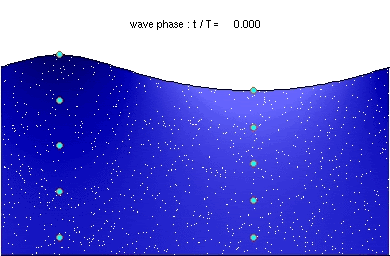Wind waves are one of those phenomena which suggest such a huge variety of concepts that are an unfathomable source for metaphors. Either if you're a poet, a journalist, a politician, you'll find the concept as a most useful tool; wave of change, wave of emotions, shock wave, ride the wave, heat wave..., it's so open a concept that I can't help using it too.
 |
| Shallow Water Waves |
 |
| Deep Water Waves |
And let me set here my analogy:
The horizontal axis is Time, and wind is Progress, either by scientific knowledge, by exchange of experiences of by creation of new philosophical or religious theories.
Depth is the variety of social environments in a society. The closer to the surface you are, the more exposed you are to influences, may it be education, commerce, social media, travel, migration, etc.
People "orbit" in circles around their own political/religious/social believes, but are dragged at the same time by the horizontal movement of progress. The closer to the surface, the more exposed they are to evolutions in thought. Each thought family evolves along time, moving forward with time, yet moving around their own varying dogmas.
In a "SHALLOW" society, the exposure to influences of any nature is easier (or at least possible) for all members, even those more isolated or less educated. Tradicions and ideas evolve, pushed by the wind of influences in the most open minded strata of society. Even the most traditional segments of the social body are dragged by the most evolved ones, and all the water body advances.
In a "DEEP" society, though, the exposure to influences is just impossible for many members of society. Although great (or small) parts of the people are exposed to evolution, they cannot carry with them the society as whole, and their own evolution is very limited.


